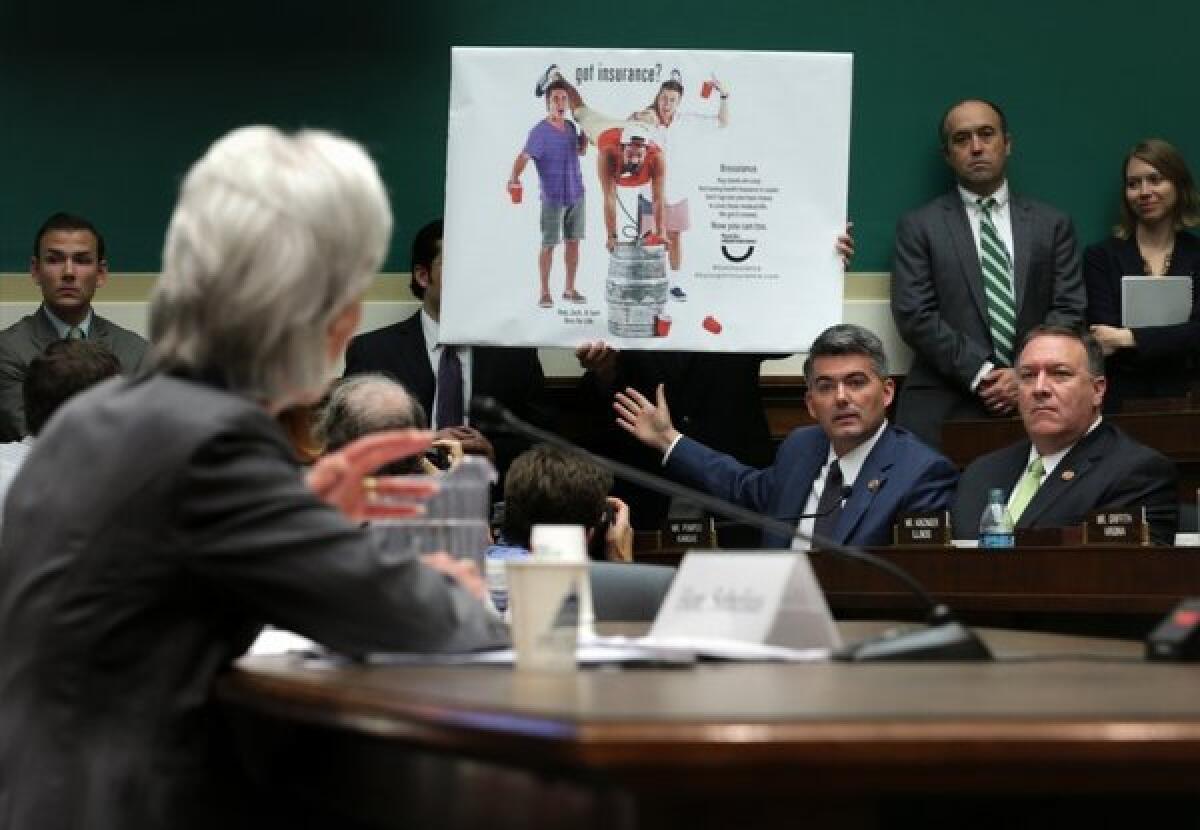Remember when people hated their health insurance plans?

The weirdest thing about the ongoing conniption about the cancellation of people’s health insurance plans -- supposedly as a result of Obamacare -- is the notion that these are plans people liked, even loved.
When did that happen?
It wasn’t so long ago -- months, even weeks -- when the health insurance companies were being roundly cursed for their ruthless mistreatment of individual health plan customers. Constant rate hikes. Cancellations after policyholders got sick. Endless hoops to jump through to file a claim or appeal a rejection.
Now, thanks to political grandstanding in Congress, lazy news reporting and, yes, the administration’s massive flub in launching its health exchange website, we’re being led to believe that the pre-Obamacare era was a golden age of individual health insurance. And now, sadly, it’s gone forever.
So let’s take a stroll down memory lane.
Until the cable news networks and Republicans in Congress suddenly discovered that people were happy with their old health plans, the standard health-insurance story you’d find in the news would describe policyholders being driven out of the insurance market and into the poorhouse by spectacular, unexplained and unwarranted premium hikes.
Indeed, an exceptionally ill-timed increase by Anthem Blue Cross in February 2010 -- as much as 39%, on the heels of a 68% increase the year before -- was what jump-started a stalled healthcare reform effort in Congress that finally yielded the Affordable Care Act.
What was important about those hikes, of course, was that they vastly exceeded the rate of medical inflation.
Nor did the rate hikes cease after that. The California Insurance Department’s website shows no fewer than seven rate hikes put through by Anthem since May 2012, some for as much as 27%, affecting hundreds of thousands of California policyholders at a swipe. And California has a reasonably competitive insurance marketplace. In states served by only one or two insurers, the sky’s the limit.
That context is woefully missing from all the reports you’ve been reading and seeing about individual policyholders being forced into new, supposedly more costly health plans come Jan. 1. Leaving aside that the Obamacare-compliant health plans often will be more comprehensive than the canceled plans, these news reports invariably compare the 2013 premiums of the old plans with the 2014 premiums of the new.
The assumption is that those 2013 premiums would have been etched in stone. But that’s a steaming pile of baloney; if we know anything about the health insurance marketplace, we know they would have been subject to increases in 2014 -- double-digit increases, as history shows. Older policyholders would have been really squeezed if not for the Obamacare rule limiting the premium differential between older and younger customers to 3-to-1.
Rate-hike stories used to go hand in hand with features about families whose claims were denied by faceless bureaucrats at insurance company headquarters, or people driven into bankruptcy by devastating diseases that kept them out of the insurance market altogether. Anyone remember those stories? I sure do. Were those features of the old plans that made people happy?
Another fatuous claim made by Obamacare critics is that these policyholders are not merely being deprived of health plans they love, but of their right of “free choice.” The pitch is: They selected these plans, why shouldn’t they be permitted to keep them? (After all, isn’t that what President Obama promised?)
Does anyone really believe these customers all exercised free choice? In many cases, their own words give the lie to the notion; they ended up with these plans precisely because they had no choice. They had been priced out of the open market because preexisting conditions made them ineligible for plans that were both comprehensive and affordable. So their only choice was a plan that was not comprehensive, but cheap. Those exclusions, it bears repeating, are no longer legal.
What the overheated tale-telling about people losing their beloved old insurance plans really demonstrates are the consequences of the federal health-exchange website’s meltdown.
It’s fair to say that we wouldn’t be hearing many of these supposed horror stories if customers receiving cancellation notices were able to hop onto healthcare.gov and see their alternatives on the spot. (That applies to residents of the three dozen states whose foresighted political leaders chose not to set up their own websites, unlike states such as California, New York, and Kentucky, where sign-ups are proceeding relatively glitch-free.)
With the federal website down -- though it seemed to be working much better Thursday morning when I checked it -- many customers are caught in a temporary limbo. They have a cancellation notice effective Jan. 1 in one hand, and a computer mouse that can’t get them information about their options in the other. That may be the best reason to get that website fixed, and quick.
But it’s time to retire the threadbare meme that the cancellation notices are depriving people of something they love, as though their health plans are as much as part of the family as the dog.
A large proportion of Americans with individual plans viewed them with skepticism, even hatred. And among those who had medical conditions requiring that they access their benefits, that proportion was undoubtedly much higher. So the next time you hear someone declaring that they were happy with their old plan, ask them this: What was so good about it?
More to Read
Get the L.A. Times Politics newsletter
Deeply reported insights into legislation, politics and policy from Sacramento, Washington and beyond. In your inbox three times per week.
You may occasionally receive promotional content from the Los Angeles Times.











